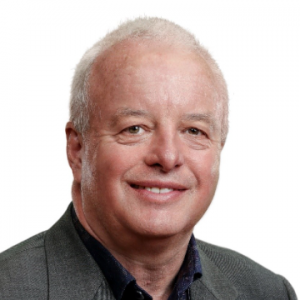Confirmed Speakers

Dr. Craig Stephen
Dr. Craig Stephen has devoted his career to developing ideas, people, policies and evidence to concurrently promote the health of people and animals and their shared environments. Craig trained as a veterinarian and epidemiologist. He is Fellow of the Canadian Academy of Health Sciences and a Clinical Professor at the School of Population and Public Health at the University of British Columbia. He currently leads the McEachran Institute, a Canadian charitable organization that believes that action is the key to a future where every species and generation can achieve their full health potential. He has worked extensively on issues we face in the current polycrisis including biodiversity loss, pandemic and emerging diseases prevention and climate change impacts on health.

Dr. Chelsea Himsworth (DVM, MVetSc, Dipl ACVP PhD)
Dr. Chelsea Himsworth (DVM, MVetSc, Dipl ACVP PhD) is a veterinary pathologist and epidemiologist who is the Deputy Chief Veterinarian for the Province of British Columbia, Canada, the British Columbia Regional Director for the Canadian Wildlife Health Cooperative, and an Associate Clinical Professor in the School of Population and Public Health at the University of British Columbia. Her research and practice is centered around One Health-based transdisciplinary approaches to the surveillance and management of health issues at the human-animal interface.

Dr. Diego Nobrega
Dr. Diego Nobrega is an assistant professor at the University of Calgary’s Faculty of Veterinary Medicine, where he also holds an NSERC Canada Research Chair in Antimicrobial Resistance and One Health. Diego is a DVM with a MSc in Preventive Veterinary Medicine and a PhD in Infectious Diseases. He also worked for the Public Health Agency of Canada in the Foodborne and Antimcirobial Resistance Surveillance Division for approximately 3 years. In Calgary, Diego oversees a research program focused on the One Health aspects of antimicrobial resistance, and his primary aim is to design effective evidence-based intervention and control strategies to combat antimicrobial resistance in veterinary medicine.

Dr. Tim McAllister
Dr. Tim McAllister was raised on a mixed cow-calf operation in Inniisfail Alberta. He obtained his M.Sc. in Animal Biochemistry at the University of Alberta and his Ph. D. in microbiology and nutrition from the University of Guelph in1991. He is presently a principal research scientist with Agriculture and Agri-Food in Lethbridge, Alberta, Canada. Tim leads a diverse research team that has been studying antimicrobial resistance in beef cattle production systems since 1997. The team’s recent work has focused on studying AMR from a “One Health” perspective using enterococci, E. coli and metagenomics as AMR indicators in livestock production systens, human sewage and clinical settings. He is also investigating the role of integrative conjugative elements in the transfer of antimicrobial resistance genes within the bacterial bovine respiratory disease complex. Tim has authored over 900 scientific papers, the recipient of several national and international awards and holds adjunct professorship appointments at several universities in Canada and abroad.

Dr. Aruna Ambagala
Dr. Aruna Ambagala is the Section Head at the Mammalian Diseases Unit, and the WOAH (OIE) reference laboratory expert for African and classical swine fevers at the Canadian Food Inspection Agency- National Centre for Foreign Animal Disease, Winnipeg, Canada. As the Section Head, he oversees testing services, technology development, research, training and scientific consultation to the national animal health program for high-consequence viral diseases such as classical and African swine fever, bluetongue, epizootic hemorrhagic disease, Schmallenberg, rabbit hemorrhagic disease, pseudorabies and other emerging viral diseases affecting farm animals. Dr. Ambagala received his Bachelor of Veterinary Medicine degree from Sri Lanka and his PhD from the University of Nebraska-Lincoln, NE, USA. He holds adjunct appointments at the Faculty of Veterinary Medicine-University of Calgary, the Department of Animal Sciences and the Department of Medical Microbiology and Infectious Diseases – University of Manitoba.

Dr. Dayna Goldsmith
Dr. Dayna Goldsmith – Graduated from UCVM in 2013 as part of the second graduating class of vet students. Completed a residency in Anatomic Pathology at the University of California Davis becoming a diplomat of the American College of Veterinary Pathologists in 2016. Works at UCVM as an instructor and diagnostic pathologist within the Diagnostic Services Unit with expertise in Wildlife Pathology. Also the director of the Alberta Node of the Canadian Wildlife Health Cooperative (CWHC).

Dr. Catherine Bouchard
Dr. Catherine Bouchard manages the Ticks and Tick-borne diseases unit within the Public Health Risk Sciences division at Public Health Agency of Canada and she is a professor adjunct at Université de Montréal. Since completing her PhD at Université de Montréal (2014), Dr. Bouchard has worked in the field of vector-borne zoonoses and has created a comprehensive and creative research program in the field of tick-borne diseases (TBDs) that are emerging in response to changes in the climate and the environment. Her research is dedicated to improving the prevention and response toward emerging, re-emerging and/or endemic TBDs. Her research program is organized into four research axis: (1) Integrated risk assessment, (2) Understanding infection dynamics in natural hosts and the environment, (3) Optimizing integrated/One Health surveillance approaches, and (4) Innovation in risk reduction and health promotion.

Dr. Claire Burbick
Dr. Claire Burbick is the Section Head of Bacteriology and Mycology for the Washington Animal Disease Diagnostic Laboratory and Clinical Associate Professor in the Department of Veterinary Microbiology and Pathology at Washington State University. In addition, she is Director of the Clinical Microbiology Residency Program which is responsible for training new veterinary microbiology specialists. Dr. Burbick completed her DVM at Washington State University, as well as her clinical microbiology residency and PhD. Dr. Burbick’s primary interests include infectious disease diagnosis and topics in antimicrobial resistance and stewardship.

Dr. Theophilus Odoom
Dr. Theophilus Odoom is a specialist Veterinary diagnostic pathologist, multidisciplinary researcher, head of Accra Veterinary Laboratory and a Part Time lecturer at the School of Veterinary Medicine University of Ghana. He conducts research into emerging and re-emerging zoonotic pathogens and also develops diagnostic tools for detecting these pathogens. One health approach is the vehicle for his research. Theo connects his research with government policy development, veterinary industry and academia, He’s lecturing systemic pathology and Diagnostic Clinics with supervision of Mphil and Bachelor student. His major research projects include enhancement of antiviral T-cell responses for improved control of viral infection using avian influenza as a model study, Rabies diagnosis, developing IFT test assay for Marburg diagnosis and oral fluid aggregate as a means of surveillance in the pig industry. He has wide range collaborators around the world focusing on cutting edge research and diagnlsis.

Dr. Clarice Lulai Angi
Dr. Clarice Lulai Angi is the Director of the Animal Health Science Directorate in Science Branch, Canadian Food Inspection Agency. She is a veterinarian and holds a Master’s Degree in Theriogenology. She has worked in various roles of increasing responsibility in the CFIA, in all four branches delivering the Animal Health program: Operations, Policy and Programs, International Affairs and Science. Her ability to connect people with opportunities has led to increased collaborations nationally and internationally. She leads a team of experts and veterinary epidemiologists responsible for risk assessment, risk intelligence, epidemiology and surveillance, laboratory services, data systems management and research coordination. Importantly, she has been involved in the CFIA’s response to Highly Pathogenic Avian Influenza since 2022, having co-led the organization of the One Health HPAI monthly meetings (with ECCC), bringing together federal, provincial, and territorial government representatives in animal and public health as well as representatives from Natural Resources departments, in a true One Health collaboration. She is a member of the Highly Pathogenic Avian Influenza Task Group that has been assembled by the Chief Veterinary Officer for Canada to study if and how Canada could use vaccines to prevent or limit the spread of HPAI in poultry and has represented Canada in the Standing Group of Experts on HPAI at the Global Framework for the Progressive Control of Transboundary Animal Diseases for the Americas (SGE, GF-TADS). She is the current president of the Canadian Animal Health Laboratorians Network and is involved in a number of collaborations with CWHC, ECCC and Public Health Agency of Canada to better understand HPAI to ultimately improve the health of animals in Canada and around the world.

Dr. John Gilleard
Dr John Gilleard BVsc PhD DipACVM DipEVPC FCAHS FRCVS is a veterinarian, Professor of Parasitology and Associate Dean of Research at the University of Calgary Faculty of Veterinary Medicine (UCVM). His research program focuses on anti-parasitic drug resistance, molecular diagnostics and improving sustainable parasite control. He has a particular interest in ruminant parasites but also has active projects in companion animals and humans. He is a Fellow of the Canadian Academy of Health Sciences (CAHS), a Fellow of the Royal College of Veterinary Surgeons (RCVS) and former president of the American Association of Veterinary Parasitology (2018).
WOAH-Bio Prevail Speakers

Dr. Isabella Monne
Dr. Isabella Monne is a veterinarian and currently leads the Viral Genomics and Transcriptomics Laboratory at the Istituto Zooprofilattico Sperimentale delle Venezie (IZSVe), a public health institute in Italy that serves as the EU, FAO, and WOAH Reference Laboratory for Avian Influenza and Newcastle Disease. At the international level, she is actively engaged in supporting low-income countries in the fight against viral diseases and in strengthening veterinary diagnostic capacities. Her research mainly focuses on the application of sequencing technologies and bioinformatics tools to investigate the evolution of priority animal viral diseases, with a particular emphasis on avian influenza.
